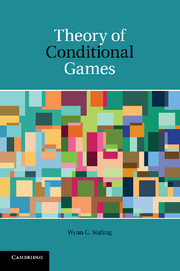7 - Applications
Published online by Cambridge University Press: 05 January 2012
Summary
Nothing is more practical than a good theory.
– Ludwig BoltzmannIn this chapter we present some application examples that are more lengthy than the examples discussed in earlier chapters. Although these examples are heavily stylized, they illustrate essential features of decision making in various contexts. The first three examples, the Battle of the Sexes, Ultimatum, and the Stag Hunt games, are games, along with the Prisoner's Dilemma game discussed in earlier chapters, that have received a great deal of attention as important examples of game theory, since they serve as models of many real-world situations. The fourth example, the Family Walk, is a social choice example that illustrates how conditional utilities can be used to define a social network in which, although every participant gets a vote, the votes are not delivered in a social vacuum. The fifth and final example is that of a multiagent system comprising three autonomous decision makers that must function cooperatively.
Battle of the Sexes
As discussed in Example 1.3, the Battle of the Sexes game involves a man and a woman who plan to meet in town for a social function. She (S) prefers to go to the ballet (B), whereas he (H) prefers the dog races (D). Each prefers to be with the other, however, regardless of where the social function takes place.
- Type
- Chapter
- Information
- Theory of Conditional Games , pp. 174 - 208Publisher: Cambridge University PressPrint publication year: 2011



